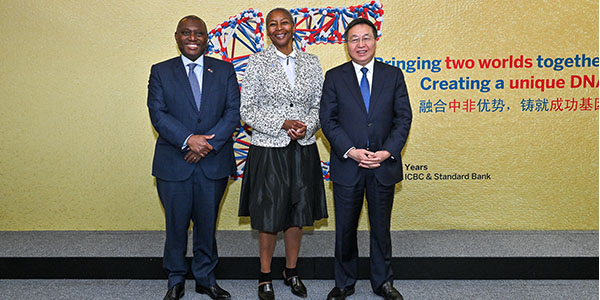
AGOA vital to sustainable growth, job creation and industrialisation, says Standard Bank
The African Growth and Opportunity Act (AGOA) is a pivotal agreement between the US and Africa to support and help grow African industries and markets, says Standard Bank, Africa’s biggest lender by assets.
Speaking ahead of the 20th AGOA Forum taking place from 2-4 November 2023 in Johannesburg, Kenny Fihla, Chief Executive, Corporate & Investment Banking at Standard Bank Group, says a significant renewal of AGOA will help drive trade and support ongoing investment ties between the US and Africa. The benefits are profound, as it will also support sustainable growth, job creation and industrialisation.
This comes as Africa’s businesses are challenged by access, costs, risks and credit issues when trading across regional and international borders.
“African businesses and markets are becoming increasingly sophisticated and ready to go to the next level. Powerful initiatives like AGOA and the African Continental Free Trade Area (AfCFTA) are key to making this happen,” says Fihla.
Recent statistics show the significant impact AGOA has on trade. Total US AGOA imports were $9.4 billion in 2022, up 57% from $6.0 billion in 2021 and more than double 2020 values. Notably, AGOA non-energy imports increased by 21% in 2022 to $5.0 billion. The top non-energy import categories included motor vehicles ($1.5 billion), textile and apparel ($1.4 billion), agricultural products ($679 million) and metals ($626 million).
As the leader in facilitating Africa-US trade, Standard Bank is leveraging its resources to enable access to and participation in regional and global value chains and to ensure partnerships with leading economies like the US continue to flourish. “We believe that active contributions to public-private dialogues like AGOA are essential to these developments and future growth,” adds Fihla.
AGOA grants duty-free, quota-free treatment for exports from eligible sub-Saharan Africa countries into the United States (US), with 35 countries eligible for AGOA benefits in 2022. AGOA is up for renewal in 2025.
“As the largest economy in the world, the US is an essential driver of global trade and investment. We are, as Standard Bank, in turn committed to driving Africa as an attractive investment market to all investors, including those from America,” continues Fihla.
Africa is a continent of traders.
Together with AGOA, Standard Bank is also optimistic about the transformative impact AfCFTA can have on inter-regional trade in Africa.
The US has expressed its support for the AfCFTA, which, once fully implemented, will be the world’s largest free trade area, bringing together 55 countries with a combined GDP of approximately $3.4trillion.
“The AfCFTA will create much-needed efficiencies across Africa’s trade borders. The potential with the world’s biggest economy is immense as financing for priority infrastructure projects, energy and other key investments take place,” articulates Fihla.
Standard Bank believes this single market holds the key to unlocking sustained levels of growth, reducing poverty and scaling up industrial capacity across the continent.
“We are committed to building trusted and efficient domestic/ regional value chains integrated into global supply ecosystems. Standard Bank is building finance and trade solutions to help address the tariff and non-tariff barriers required to realise the continent’s ambitions. Standard Bank is also leading efforts to reduce the impact of climate change by building sustainable solutions. The future is extremely bright – especially if we have the right partners on board,” says Fihla.
As long-term Africa bulls, Standard Bank is convinced that Africa is the growth story of this century.
“This week’s AGOA Forum is an important opportunity for the continent to showcase its value and growth prospects while it also allows the US to engage and see for itself what benefits this agreement continues to bring,” concludes Fihla.


